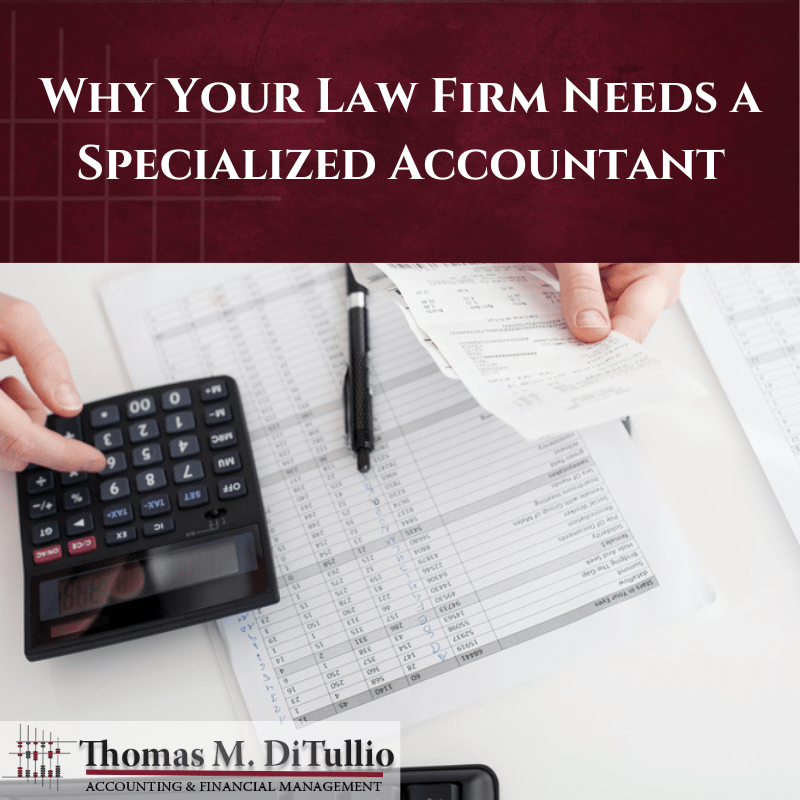Why Your Law Firm Needs a Specialized Accountant
Law firms have unique financial needs that must be addressed differently than how other types of businesses handle their finances. A law firm’s need for specialized accounting applies to both the firm’s business and accounting strategies and how they track and manage various types of accounts. Because of the requirements law firms have, they can benefit from working with accounting firms that offer small business accounting services to attorneys. TMD Accounting provides accounting services that focus on the unique accounting needs of law firms and can help your firm stay on track.
Help With Income Forecasting
Most law firms use billable hours to determine how much to charge clients. Many attorneys charge for their time in six- or 10-minute increments. Tracking billable hours can be a headache for many attorneys. To ensure that your firm is accurately determining its billing, we can help you transition to tools in the cloud to track your lawyers’ hours. Using the cloud can help you to accurately and efficiently track billable hours for every client while reducing or eliminating time losses. Many small- and mid-sized law firms contend with income fluctuations, which make managing your firm’s cash flow important to your success. Our accountants help law firms to manage accounts payable, create forecasts, and reduce the time involved with receiving payments for accounts receivable.
Optimizing Taxes
Employment agreements with attorneys can be structured by law firms in different ways. Some firms pay attorneys as independent contractors. Others hire lawyers as full-time, salaried employees. Some agreements might include profit-sharing or bonuses. What might work for your firm will depend on several factors. An accounting firm that specializes in providing services to law firms can help you choose the structure that works the best for your business.
In addition to your employment agreements, you also need to ensure that you have the right business structure. The business structure you choose for your law firm can affect the taxes you might pay. We can help you choose the structure that will provide you with the most tax advantages.
Tracking Trust Funds
Law firms must keep their clients’ funds in separate trust accounts and cannot commingle them with their other money. Many firms ask for retainers upfront before they begin work. Firms must follow strict rules when they hold client funds in a trust account for recordkeeping and client notification. It is critical for you to avoid commingling the funds with your firm’s money or using one client’s money to pay for services you provide to another client. If you mismanage your trust accounts, deposit funds in the wrong account, or fail to meet your recordkeeping and reporting requirements, you could face significant penalties, including the possible suspension of your law license. A specialized accountant can help to track client funds to ensure you avoid these types of mistakes.
Matter Cost Tracking
Law firms have both direct and indirect costs. You must correctly identify which costs are direct and indirect. The accounting for direct and indirect costs must be handled differently. Our accountants can help to identify which costs are direct or indirect and account for them properly.
How to Choose the Right Accounting Firm
Choosing the right accounting firm to handle your law firm’s accounting needs is important. Here are some tips to find the right legal accountant for your firm.
1. Ask About the Company’s Experience
While finding an experienced accountant is important, you want to find an accounting firm that has significant experience working with legal clients. Ask a prospective accounting firm about its experience working with law firms.
2. Ask About the Services Provided by the Firm
You will want to know about all of the services the accounting firm offers to law firms and their levels. For example, you will need to determine the degree of control you want to give the accounting firm over your bookkeeping. If you want comprehensive accounting services, you will want to look for a full-service firm. Some firms have bookkeepers to handle daily transactions. Others might charge more if you need to hire a certified public accountant to handle regular bookkeeping tasks.
3. Ask About Audit Support
It is a good idea for you to find an accounting firm that offers help in case your law firm is audited by the state or the Internal Revenue Service. The state licensing body can audit law firms to ensure they are accurately tracking and handling client funds, and the IRS audit can happen to anyone. Undergoing an audit can be stressful. If you have a trusted accountant’s help during an audit, it can greatly reduce your stress because you can feel confident in the accuracy of your financial data.
4. Ask About Fees
Accounting firms have different payment structures. Some charge flat fees for each task performed while others charge by the minute. You will want to understand your accountant’s fee structure so that you will know whether your accountant’s bill will increase each time you make a phone call or whether it will be calculated by task.
5. Ask for References
It is a good idea to ask other law firms about their experiences working with the accounting firm you are considering. Word-of-mouth referrals can help you determine which firms are known to provide good specialized services to law firms. You can also ask the firm you are considering to provide you with references from law firms that have used or currently use their services. Follow up with any references you are provided to ask about their experiences.
Talk to an Accountant for My Small Business
As an attorney, it is critical for you to carefully track your firm’s and your clients’ money. Working with an experienced accountant at TMD Accounting can help to ensure you meet your regulatory requirements and grow your practice. Contact us today for a consultation by calling 1-856-228-2205.

